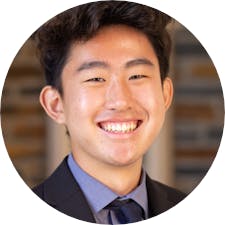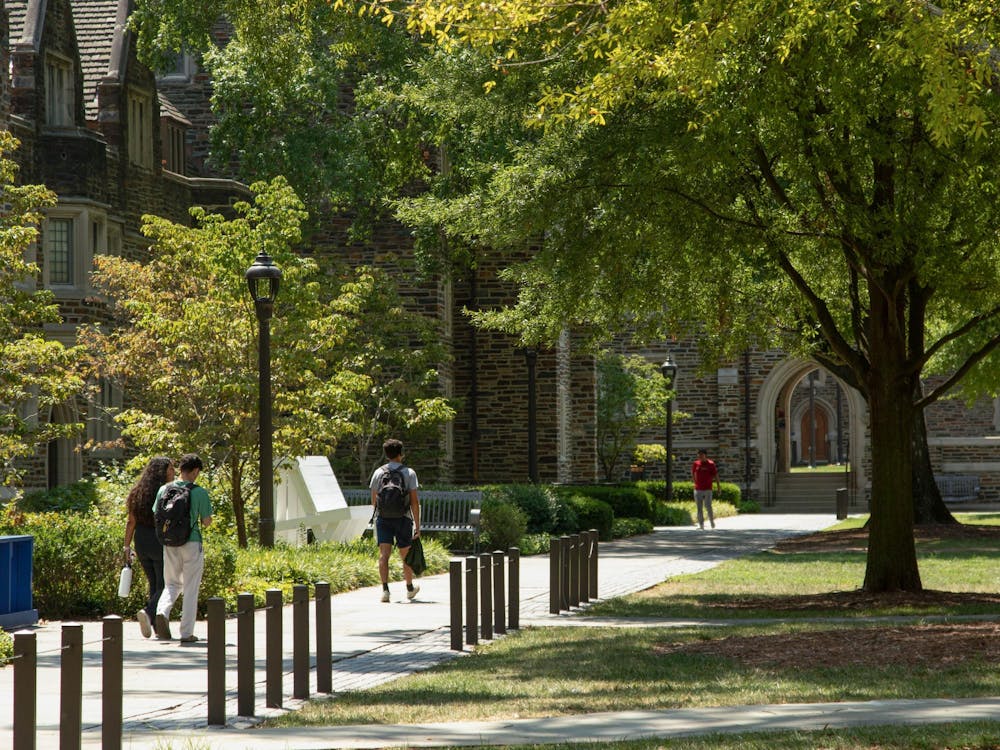Every academic year, a select group of Duke students are inducted into a unique institution that combines leadership, service and school pride.
Duke Presidential Ambassadors, formerly known as Dukes and Duchesses, is an organization of student representatives that serves the Office of the President. Notable duties include representing the University at high-profile events and leading campus tours.
From high schoolers visiting campus for the first time to alumni returning to reminisce on their undergraduate years, DPA members are often the first point of contact for guests, creating a lasting impression of the University and its values.
Behind administrative doors
As the name suggests, DPA members work closely with President Vincent Price to assist with behind-the-scenes logistics for special events and ceremonies that are hallmark celebrations of the University.
Terria Beck-Scott, program director for university ceremonies and adviser to the DPA program, often calls on student members to aid in coordinating events that “mark different moments for students, faculty and staff alike.” These include various convocations, the Founders’ Day awards dinner, Presidential Award ceremonies and Commencement weekend, among others.
Such events serve as the cornerstone of many members’ experience with the organization by providing a glimpse into higher level leadership within Duke.
“DPA does provide opportunities to get to know senior administration and sort of learn the direction that Duke is heading in,” said DPA Secretary junior Tara Singh.
Singh shared that the cohort of ambassadors recently heard insights from Dean of Undergraduate Admissions Christoph Guttentag and Director of Athletics Nina King on “the present and future of the Duke admissions process” and “the changing landscape of college sports,” respectively.
Junior Athena Yeung, director of internal engagement for DPA, commented that many students get caught up in living their own life and thinking about that next class or upcoming exam and don’t always stop to consider the invisible gears that are always turning behind closed administrative doors.
“I think being able to see Duke from a bird’s-eye view isn’t something you typically think of as an undergrad,” Yeung said. “The University has really high-level goals that the admin[istration] is always thinking about — and thinking far into the future.”
In addition to enjoying participating in big-name speaker events, members also benefit from one-on-one interactions with past, present and future members of the Duke community.
DPA members are held to high standards of commitment, with mandatory biweekly meetings and a minimum threshold of volunteer hours and campus tours required each semester to retain membership. According to junior Ben Childress, DPA’s director of external engagement, most of the organization’s impact comes through simple conversation with participants in these smaller events.
“Since we are ambassadors of the University, a lot of the reason why we’re there is to give the student’s perspective,” he said. “… A lot of people will come on campus and they think Duke is a completely different place.”
Leadership through service
Many members of DPA agree that the organization has redefined what leadership means to them.
In her role facilitating internal engagement, Yeung is responsible for fostering a sense of community within the cohort by organizing social events like Friendsgiving: a spin on traditional Thanksgiving dinner.
She believes that her position has taught her the importance of connections and friendships that may last a lifetime. But even outside of her distinct responsibilities, Yeung said that being in DPA overall has demonstrated how crucial communication is.
“I think how you present yourself is really key because that’s a reflection of how the University is presented,” Yeung said. “Communication can take you far if you capitalize [on] it in the right way.”
Since DPA tours are typically smaller than the traditional admissions tour, Yeung said she has learned to personalize her script in a way that resonates with her audience.
Get The Chronicle straight to your inbox
Sign up for our weekly newsletter. Cancel at any time.
For Childress, DPA completely flipped the traditional pyramid structure of leadership and its inflexible hierarchies. Because the organization encourages leadership in the form of servitude, he sees the collective community at the forefront rather than a sole figurehead.
For example, DPA recently hosted several public elementary and middle schools from the surrounding area at Duke as part of its spring service event. Members provided tours to the young students, many of whom had never stepped foot on a college campus before.
“The whole time they were asking a ton of questions and super interested in the school,” Childress said. “… I really felt that we were making an impact on their lives.”
Cultivating a legacy
Beck-Scott said that one of her favorite things about working with DPA is watching students grow throughout their time at Duke, as most members join as first-years.
“I get to see these members become the leaders we want to see go in the world,” Beck-Scott wrote in a June 20 email to The Chronicle. “I think this impact goes beyond their time at Duke — they are able to speak about who they are as a leader and engage meaningfully in new and unfamiliar spaces.”
For Childress, applying to the program became a way to establish his own Duke story. The University was a major aspect of his life even before he became a student, as his hometown is close to its Durham campus, and many of his family members are Duke alums.
“Since I went to Duke, I have had my own experiences,” Childress said. “But I still kind of felt like I was living in the shadows of my parents’ and grandparents’ experiences.”
Joining DPA was an effective way for Childress to make Duke his own by allowing him to forge a stronger relationship with his university and share his unique perspective with others. He noted that he learns something new about Duke every time he leads a tour.
Singh similarly views the organization as a way to preserve the core values of both the University and her family. Her father, Anand Singh, Trinity ‘96, always emphasized the transformative nature of education, a lesson Singh felt fortunate to have witnessed during her first year at Duke.
“I’ve been seeking ways to give back to the University that gave my family so much over the past generation,” Singh said. “DPA has allowed me to deepen my understanding of what Duke is about … I am honored to walk in my dad’s footsteps 30 years later.”
For others, DPA offered a chance to broaden their perspective on Duke by learning about how the experiences of their peers differ from their own.
Yeung cited the diversity of the organization’s applicants and members as a driving factor in her decision to join. Far from dividing the students, she believes their differences create a mosaic of ideas that facilitates greater cooperation.
“Everyone comes from a really different academic and life journey … yet we’re all very united by this common passion for Duke,” she said.
“I think that once you stay at Duke for some time, you find your group, you get really close to that group, but you might not extend outwards from that,” Childress said. “… I think [the diversity] is why people are so involved in the organization because they want to know about where people come from.”
Forging futures
Beck-Scott is enthusiastic about the future of DPA. She noted that the organization is seeing “an abundance of excitement” from current members after experiencing a “slump” during the COVID-19 pandemic when operations were forced entirely online.
“These student leaders have worked to create a community that they could be proud of and that they would want to connect with outside of a biweekly meeting,” she wrote in the June 20 email. “… Often, we see members soaring past the [engagement hours] requirement just because they are interested.”
To join DPA, prospective new members must take part in a yearlong application process. In the fall, DPA hopefuls have the opportunity to engage with current members through coffee chats and info sessions, while the spring semester consists of a written application and the infamous Duke history test.
“[The history test] is a required part of our recruitment process, and I think people get a little nervous about it,” Singh said. “We don’t expect a perfect score — what we are looking for is a good faith effort and learning the material that demonstrates reflection on the University.”
Singh emphasized that DPA prioritizes a diverse class with people who can speak on various aspects of University life.
“Come in, tell your story to us,” Singh said. “I would encourage people to apply even if they are not completely sure what they want to do. During my application cycle, I still wasn’t completely sure about joining, but now I’m so glad I did.”
At the end of the day, every DPA member is connected with a unifying trait — school pride.
“If you are a leader, you have a genuine care about the organization,” Childress said. “I’d say all Duke students are leaders because they care about the University.”

Andrew Bae is a Trinity junior and an editor-at-large of The Chronicle's 120th volume.

